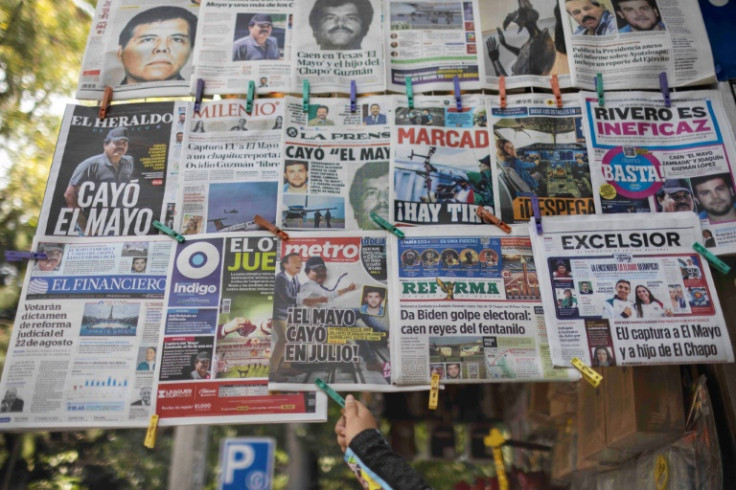
Ismael "El Mayo" Zambada, co-founder of the notorious Sinaloa Cartel and one of the world's most elusive drug lords, is set to face trial in New York City. The development mirrors the dramatic legal proceedings against his former associate, Joaquín "El Chapo" Guzmán.
A federal judge determined on August 15 that Zambada will be transferred from El Paso, Texas, to New York, where he will be tried in the same Brooklyn courtroom that saw El Chapo sentenced to life in prison in 2019.
Zambada's arrest on July 25, 2024, marked the end of nearly five decades on the run. During this time, he managed to evade capture while remaining a central figure in the global drug trade, responsible for trafficking vast quantities of cocaine, marijuana, and, more recently, the synthetic opioid fentanyl.
El Mayo goes to New York
Zambada's indictment in the Eastern District of New York, updated earlier this year, includes charges of fentanyl trafficking—a pressing concern in the United States, which has seen a devastating rise in overdose deaths due to the drug. He already appeared before a judge in El Paso, where he pleaded not guilty to racketeering conspiracy, drug conspiracy and other charges.
"As the co-founder and current leader of the largest, most powerful drug trafficking organization in the world, Ismael Zambada García is accused of supplying fentanyl to the United States at a time when the lethal narcotic has claimed lives at a devastating rate. For decades, the ruthlessly violent Sinaloa Cartel has continued its deadly scourge with the pervasive trafficking of fentanyl, cocaine, heroin, methamphetamine, and other synthetic drugs into the U.S.," stated HSI Acting Assistant Director Arvelo. "HSI New York and our law enforcement partners will not stop until we bring Zambada Garcia to justice on behalf of his countless victims."
The trial of El Mayo Zambada will likely follow a path similar to that of El Chapo Guzmán, who spent 27 months in custody in New York before his trial began in November 2018. After a three-month trial, El Chapo was found guilty on all counts and was sentenced to life imprisonment plus 30 years, currently serving his sentence at the Supermax prison in Florence, Colorado. Zambada, now 76 years old, faces the prospect of spending his remaining years in a similar high-security facility if convicted.

A trial that will reverberate in Mexico
The significance of Zambada's trial extends beyond the courtroom and the United States. His capture and subsequent trial in the United States represent another blow to the Sinaloa Cartel, which has been destabilized by the arrest of several key figures in recent years.
The recent developments in Mexico following Zambada's capture have further complicated the narrative. A letter purportedly written by Zambada has sparked controversy, accusing Mexican authorities of misconduct and alleging that his arrest was part of a broader conspiracy involving high-ranking officials. This letter has triggered investigations in Mexico, particularly concerning prominent figures mentioned by Zambada, including the Governor of Sinaloa, Rubén Rocha, and Héctor Melesio Cuén Ojeda, a former politician and rector of the Autonomous University of Sinaloa.
In the letter, Zambada claimed that Cuén Ojeda was murdered during the same operation that led to his capture.
Mexican president Andrés López Obrador and elected president Claudia Sheinbaum appeared in public defending the Sinaloa governor the same day the letter was made public. Days later, Sinaloa's General Attorney Office released a video that allegedly contradicts El Mayo's statement by showing that Cuén was killed in a gas station. This has not only cast doubt on the circumstances surrounding Zambada's arrest but has also led to a political firestorm in Mexico, with various officials, including the governor of Sinaloa, coming under scrutiny.
Zambada's capture created a ripple effect across Mexico's political landscape, with several governors and prominent politicians rallying to defend those he implicated. The controversy underscores the complex and often murky relationship between the Mexican government and the powerful drug cartels, a relationship that has long been a source of speculation and concern both within and outside of Mexico.
Caught unaware of the plans to capture Zambada, the Mexican government has hinted at an invasion by U.S. drug agents into Mexico during the negotiations that led to his arrest, while fighting to keep the peace in Sinaloa and avoid a turf war among the four factions that are part of the Sinaloa Cartel.

© 2025 Latin Times. All rights reserved. Do not reproduce without permission.






